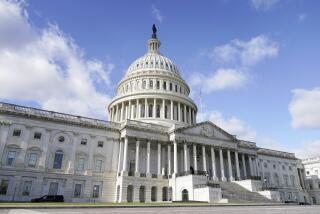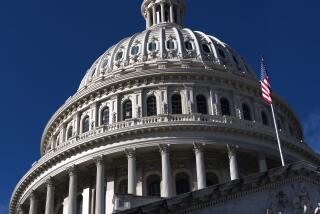Democrats, not Republicans, should be worrying about their future
Since Mitt Romney lost to President Obama on Nov. 6, the conventional wisdom has been that the Republican Party is in trouble. The less conventional truth is that it is the Democrats whose chances many be more bleak.
Yes, Republicans are currently engaged in a round of intraparty sniping between establishment conservatives and the militant, purist right-wingers who abound in the ranks of party activists. And, yes, the 2012 election exposed the GOP’s profound unpopularity among rising voting groups, especially Latinos. But one good presidential candidate and one comprehensive immigration bill could smooth over those problems.
The Republican base among older, rural, white voters may be shrinking with every new obituary, but the party has structural advantages that could forestall electoral disaster.
In the 2010 midterm elections, Republicans won big in state legislative races, picking up 675 seats nationwide. Before that election, the GOP was in full control of 14 state legislatures while Democrats were in charge in 27. After the election, Republicans had won control in 26 states and Democrats’ number had dropped to 17. As a result, Republicans were able to redraw congressional districts more to their liking in several key states. Redistricting has given Republicans such an advantage that they do not need to command anything close to a majority nationwide in order to retain control of the House of Representatives for years to come.
Republicans are also positioned well to take back power in the U.S. Senate in 2014. Here, again, being unpopular with a majority of Americans does not matter so much. Because each state gets two senators, no matter what their population may be, and because Republicans dominate in states such as Alaska and Wyoming that have fewer people than they have wild animals, the GOP has a built-in head start in the competition for Senate control.
In the coming election, there appears to be no Republican senator who is in dire risk of losing his seat, and the two who are retiring are from the GOP-leaning states of Nebraska and Georgia. Democrats, meanwhile, have six incumbent senators who are retiring, four of them from states that are favorable ground for Republicans – West Virginia, South Dakota, Iowa and Montana.
Montana got on the list of good prospects for Republicans on Tuesday when Democratic officials revealed that their chairman of the Senate Finance Committee, Max Baucus, would not be seeking reelection under the Big Sky. Fortunately for Democrats, Montana’s former Democratic governor, Brian Schweitzer, is likely to run for the seat. Schweitzer would be a formidable candidate. Of course, that assumes he does not run for president.
And that brings us to the biggest political prize of all: the presidency. Romney’s loss is what brought on all this Republican angst, but, even though he was a flawed candidate in many ways, he did not lose by a landslide. A shift of a few thousand votes in a few key states would have given him victory.
The Democrats’ assumption is that they will have an unbeatable candidate for president in 2016 – Hillary Rodham Clinton. But things can change quickly. By 2016, she may have lost her luster and feel to many voters like a too-familiar person out of the past. Her age may become a factor. Or she may simply decide she does not want the job. Sure, there are candidates waiting in the wings – Schweitzer, for instance, and good old Joe Biden – but none of them comes near the category of unbeatable.
Republicans might blow an opportunity for victory by going crazy and nominating a man to please their fevered base -- Rand Paul or Rick Santorum -- but they could also make their pick someone from vote-rich Florida – Jeb Bush or Marco Rubio – and stand a good chance of winning the White House. Bush is the smarter brother in his famous political family and would appeal to the centrist voters who swing elections. Rubio is a youthful, fresh face of conservatism. Either man could cut into the Democrats’ Latino vote enough to sway an election.
Are Republicans in trouble? If a Republican president is sworn in on January 20, 2017, with Republican majorities in both chambers of Congress, we will know it is the Democrats we should have been worrying about.
More to Read
A cure for the common opinion
Get thought-provoking perspectives with our weekly newsletter.
You may occasionally receive promotional content from the Los Angeles Times.







